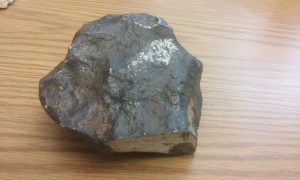
Students and professors in BYU’s Department of Geological Sciences know geology is more than just the study of rocks. They say studying geology has given them the opportunity to travel the world, make new discoveries and appreciate the Earth and its beauty.
Jani Radebaugh, a BYU geology professor and specialist in solar system geology, said she finds geology spiritually uplifting and fulfilling. She said she has felt spiritually strengthened as she teaches her students about the Earth and the solar system.
“(My students) can see that geology is a new way to understand the Creator, and they see the complexity and beauty that goes into making the planet we live on,” Radebaugh said.
Radebaugh has also seen that studying geology gives students the unique opportunity to make new discoveries themselves. She said a BYU student once brought in a rock he had found in Utah to her for identification because he thought it was a meteorite. She confirmed his guess after inspecting the rock and informed him the rock was extremely old and had been formed during the creation of the solar system.
The new free Meteor Counter mobile app developed by NASA for iPhones is a tool anyone can use to track falling meteors and potentially recover them, according to Radebaugh. Using the app, people can identify the position, speed and potential landing spot of the meteor if the sighting was also logged by other users. NASA scientists also use the app’s data to better understand meteoroids entering Earth’s atmosphere.
Radebaugh recently went on a meteorite hunt on a dry lake bed in Utah accompanied by the BYU Geology and Astronomical Society Clubs. Students brought metal detectors with them to the lake bed because meteorites are often heavier than other types of rocks because of the metals and other heavy materials they contain. A metallic crust forms on the outside of meteorites, making them easier to identify when compared to other rocks. Radebaugh said the trip to the lake bed was a success, as they found two small meteorites during their expedition.

Students and professors say they also enjoy the field trips, activities and hands-on learning experiences geology offers. Chelsea Grady, a junior majoring in geology, has been in the program for two years. Grady has a rock collection that fills three shoe boxes and said she enjoys geology because it shows her how the world works.
“In geology, there’s a lot of field trip opportunities; a lot of the studying is out in nature, which really sets geology apart,” Grady said. “With other majors you go on internships, but with geology there are actual classes where you go camping and mapping to study the rocks.”
Grady also said she feels geology is a versatile field, with options for students to focus working in the oil industry, disaster prevention and national parks.
Mariah Chambers, president of BYU’s Geology Club, said she first became interested in geology as she went on trips with her family to national parks. She said she loves rocks that “tell a story” with their bands and folds. Chambers’ rock collection is composed of about 100 to 200 pounds of rocks, many of which she found herself.
She said her favorite activity the Geology Club has sponsored was a science night at an elementary school featuring demonstrations, fossils, rock samples and more. The club members taught the students how to get involved in science and geology.
“It was a good foot in the door for the students and helped (them) see long-term potential in their fascination with earth science,” Chambers said.
As a geology major, Chambers has had the chance to travel to Hawaii and to the Bahamas to study volcanoes and carbonate systems. Some of her favorite times as a geology student are when she, her professors and fellow students spend time around the campfire while on field trips. She said the professors often bear their testimonies and speak about how much they appreciated God’s creations and the opportunity to study them.
“It builds my testimony a lot to be able to experience the wonders of God’s creations,” Chambers said. “The more I learn about them the more I realize I don’t know, and I see how complex the world that God created really is. It increases my faith in God as our creator.”




